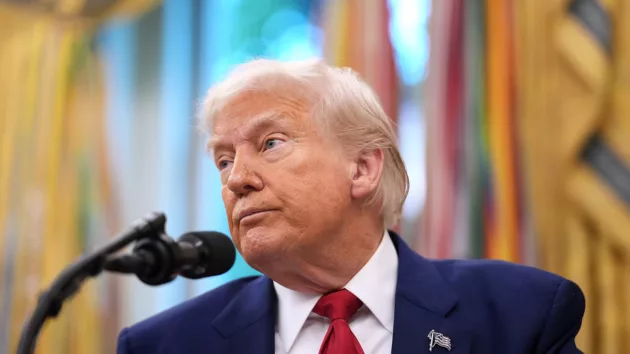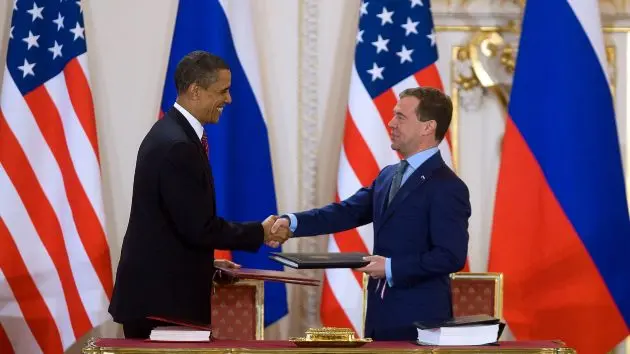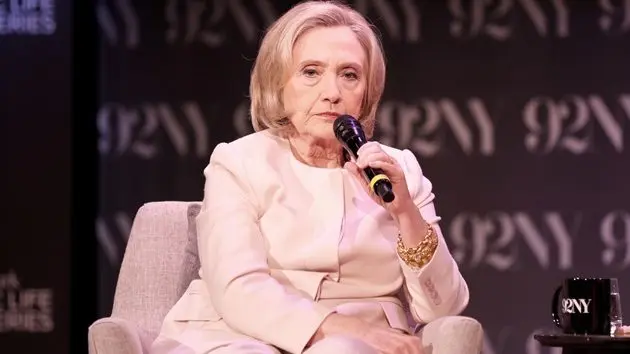
(WASHINGTON) — A federal appeals court is temporarily delaying Wednesday’s court order blocking President Donald Trump’s tariffs, reinstating them at least for the time being.
The United States Court of Appeals for the Federal Circuit issued an administrative stay of the decision while it considers Trump’s appeal.
The administration earlier Thursday urged the New York-based Court of International Trade to delay its order, warning that enforcement of the ruling will cause a “foreign policy disaster scenario.”
In an opinion on Wednesday, the three-judge panel struck down Trump’s global tariffs as “contrary to law.”
The judges found that the International Emergency Economic Powers Act — which Trump used to enact his tariffs — does not give him the “unlimited” power to levy tariffs like the president has in recent months.
“The President’s assertion of tariff-making authority in the instant case, unbounded as it is by any limitation in duration or scope, exceeds any tariff authority delegated to the President under IEEPA. The Worldwide and Retaliatory tariffs are thus ultra vires and contrary to law,” the judges wrote.
According to the judges, Congress, not the president, has the authority to impose tariffs under most circumstances, and Trump’s tariffs do not meet the limited condition of an “unusual and extraordinary threat” that would allow him to act alone.
On Thursday, a second federal court determined that Trump’s global were “unlawful.”
U.S. District Judge Rudolph Contreras said in an order the International Economic Emergency Economic Powers Act does not give the president the power to impose most of his recent tariffs.
Notably, the decision from Contreras – an Obama appointee – only restricts the Trump administration’s ability to collect tariffs from the two companies that filed the lawsuit, Learning Resources, Inc., and hand2mind, Inc.
The Department of Justice on Thursday requested a stay to Wednesday’s ruling, saying it’s needed “to avoid immediate irreparable harm to United States foreign policy and national security.”
“It is critical, for the country’s national security and the President’s conduct of ongoing, delicate diplomatic efforts, that the Court stay its judgment. The harm to the conduct of foreign affairs from the relief ordered by the Court could not be greater,” lawyers with the Department of Justice argued.
According to the administration, the court order would strip the president of leverage in trade negotiations, imperil the trade deals already reached, and make the country vulnerable to countries that “feel a renewed boldness to take advantage of” the current situation.
Responding to the ruling, White House spokesman Kush Desai evoked the trade deficit and said, “It is not for unelected judges to decide how to properly address a national emergency,” adding that that the administration is committed to using “every lever of executive power to address this crisis.”
The Trump administration had quickly filed a notice of appeal to challenge Wednesday’s decision.
The case now heads to the United States Court of Appeals for the Federal Circuit where they could ask for a stay of the order.
The Court of International Trade issued the decision across two cases — one filed by a group of small businesses and another filed by 12 Democratic attorneys general.
Nevada Attorney General Aaron Ford called the ruling “a win for the rule of law and for Nevadans’ pocketbooks.”
“I am extremely pleased with the court’s decision to strike down these tariffs; they were both unlawful and economically destructive,” he said. “The president had no legal authority to impose these tariffs, and his unlawful actions would have caused billions of dollars of damage to the American economy.”
Since Trump announced sweeping tariffs on more than 50 countries in April, his administration has faced half a dozen lawsuits challenging the president’s ability to impose tariffs without the approval of Congress.
New York Attorney General Letitia James called the decision a “major victory for our efforts to uphold the law and protect New Yorkers from illegal policies that threaten American jobs and economy.”
“The law is clear: no president has the power to single-handedly raise taxes whenever they like. These tariffs are a massive tax hike on working families and American businesses that would have led to more inflation, economic damage to businesses of all sizes, and job losses across the country if allowed to continue,” James’ statement continued.
Lawyers for the small businesses alleged that the International Emergency Economic Powers Act — which Trump invoked to impose the tariffs — does not give the president the right to issue “across-the-board worldwide tariffs,” and that Trump’s justification for the tariffs was invalid.
“His claimed emergency is a figment of his own imagination,” the lawsuit said. “Trade deficits, which have persisted for decades without causing economic harm, are not an emergency.”
During a hearing earlier this month, a group of three judges — who were appointed by presidents Obama, Trump and Reagan — pushed a lawyer for the small businesses to provide a legal basis to override the tariffs. While a different court in the 1970s determined that the Trading with the Enemy Act of 1917 — the law that preceded the International Emergency Economic Powers Act — gave the president the right to impose tariffs, no court has weighed whether the president can impose tariffs unilaterally under the IEEPA.
During a May 13 hearing, Jeffrey Schwab, a lawyer from the conservative Liberty Justice Center representing the plaintiffs, argued that Trump’s purported emergency to justify the tariffs is far short of what is required under the law.
“I’m asking this court to be an umpire and call a strike; you’re asking me, well, where’s the strike zone? Is it at the knees or slightly below the knees?” Schwab argued. “I’m saying it’s a wild pitch and it’s on the other side of the batter and hits the backstop, so we don’t need to debate that.”
The ruling marks the first time a federal court has issued a ruling on the legality of Trump’s tariffs. In May, a federal judge in Florida nominated by Trump suggested the president has the authority to unilaterally impose tariffs, but opted to transfer the case to the Court of International Trade.
-ABC News’ Hannah Demissie contributed to this report.
Copyright © 2025, ABC Audio. All rights reserved.


